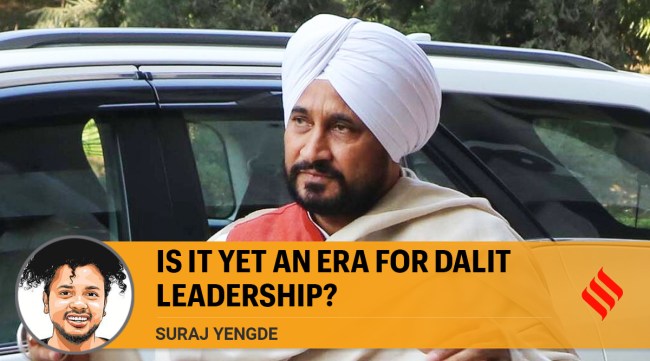Opinion Is it yet an era for Dalit leadership?
Suraj Yengde writes: Charanjit Singh Channi’s elevation as CM may be no more than an act of symbolism and charity, but there is also hope that it can throw up a challenge to the caste dominance in politics.
 Punjab Chief Minister Charanjit Singh Channi,
(Express Photo by Kamleshwar Singh/File)
Punjab Chief Minister Charanjit Singh Channi,
(Express Photo by Kamleshwar Singh/File) General knowledge questions used to be one of those adventurous intelligence-testing rounds — the capital cities of states and countries; names of presidents, heads of states… However, one question trumped me. It was ‘Name the state with the highest percentage of Scheduled Castes’. It was probably the easiest to answer for me, I thought; the question being right up my alley. Maharashtra, of course, I said, in a mix of boast, pride and surprise. “Wrong!” replied the questioner. It was Punjab. I refused to believe it. How could it be? Maharashtra, with its wide stretch of lands and large population, that has SCs across towns, cities and villages, should be the correct answer. I went to my father, who worked in the BAMCEF movement (started by Kanshi Ram), to cross-check. He confirmed it: SCs comprised 32% of Punjab’s population, against 11% in Maharashtra.
Punjab is an uneasy state. It continues to be in discussion for its proximity to Pakistan, its Sikh history, its brush with radicalism, and now the farmers’ protests on the borders of the Delhi durbar. Punjabis have a special attachment to their land, with a back story that includes politics, religion, capital and culture. Any story related to Punjab makes national headlines; there is a buzz, at least a discussion or protest, including among the diaspora abroad. However, this time a major political shift happened and there was not much discussion, barring among Dalit organisations abroad.
Charanjit Singh Channi was appointed the 17th Chief Minister of Punjab. Amidst the fight between two Jat leaders of the Congress, former CM Amarinder Singh and its Punjab chief Navjot Singh Sidhu, Channi was picked by Rahul Gandhi.
His CV is as impressive as one can find in a politician. Born into a poor family, Channi has several degrees under his belt. A self-made man, he served as a Councillor for three terms, later becoming the president of a Municipal Council, and then moving on to the Punjab Assembly as an Independent in 2007. Elected thrice as MLA, he was leader of the opposition in 2015-16.
 People close to the Gandhis confirm that Rahul picked Channi as he had proved to be a meritorious leader with tested acumen. However, another reason, and perhaps the more pragmatic one, was the BSP-Akali Dal alliance, which is going to pose a challenge to the mono-caste hegemony of the political elites in Punjab.
People close to the Gandhis confirm that Rahul picked Channi as he had proved to be a meritorious leader with tested acumen. However, another reason, and perhaps the more pragmatic one, was the BSP-Akali Dal alliance, which is going to pose a challenge to the mono-caste hegemony of the political elites in Punjab.
The numerical strength of poor people doesn’t easily convert into political stability. Or else, the question of Dalit land rights and social justice would have been addressed early on. The political pundits who arithmetically calculate the political consequences of Indian democracy have miserably failed to explain Punjab and Dalit vulnerability. The Jats in Punjab are a mere 20% of the population but control the land and resources, with the Dalits struggling to match. The last non-Jat CM of the state was Giani Zail Singh, in 1977. Ever since, landed Jats under the garb of their Sikh identity have been promoting a neo-Brahminical model, subverting the egalitarianism of the Guru Granth Sahib.
Like Channi, there are popular, charismatic Dalit leaders across parties. Mallikarjun Kharge, Sanjay Paswan, Arjun Ram Meghwal, D Raja, in effect, harmonise Indian democracy. It is to the credit of these leaders that their parties have found a firm grounding. All these leaders, including those of the ST and OBC communities, have risen on account of the anti-caste consciousness nurtured in politics by Kanshi Ram and the BSP.
However, Brahminical parties, from the right, centre and left, tend to see Dalits as subcategories and not as a unified whole. That is why sub-castes of popular Dalit leaders are repeated in loop. This treatment is not given to any other non-Dalit political persona.
Channi’s elevation as CM may be no more than an act of symbolism and charity, but there is also hope that it can throw up a challenge to the caste dominance in politics. The BSP is the elephant in the room, having created a politics around representation and fair share. The Congress, BJP and the likes have to join the queue. Is it yet an era for Dalit leadership?
The writer is the author of Caste Matters and curates the fortnightly Dalitality column





